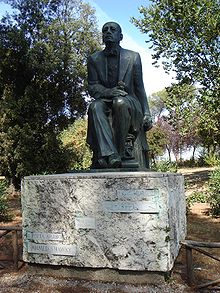Ahmed Shawqi

Ahmed Shawqi (also Ahmed Schawqi ; * 1868 ; † October 23, 1932 ) was an Egyptian poet. He is considered a pioneer of modern Arabic poetry.
Life
Shawqi grew up in a wealthy environment; his family had good connections with the court of the Khedive of Egypt. After attending college, Shawqi attended law school, which he graduated with a degree in legal translations in 1890. He was then offered a position at the court of Abbas II , which he also accepted. His first surviving works date from this time, mostly hymns of praise to the caliph. After a year, Shawqi was sent to the universities of Montpellier and Paris for three years to round off his studies . During this time Shawqi came into contact with the works of French playwrights, of whom Molière and Racine in particular had a lasting influence.
After his return to Egypt in 1894, Shawqi's influence on Arabic literature grew steadily. The experience he gained during his studies in France he now incorporated into traditional Arabic literature. Thereby he created the first lyrical theater forms of modern Egyptian literature. His second major creative period did not begin until 1914, when the English sent him into exile in Andalusia , Spain , for political reasons . It was during this time that particularly patriotic and homely poems were written. After Shawqi was allowed to return from exile in 1920, he wrote especially poems that emphasized the splendor of Egypt, the pharaohs and Islam. His most famous religious works, such as the praises of Muhammad , originated during this period. He also wrote his most important plays, which were strongly influenced by the style of his poetry, during this period. In 1927 Shawqi was given the title Amir Al-Sho'araa , translated as Prince of Poets , for his works .
Before his exile, Shawqi lived mostly near the caliph's palace in Sarah El-Qobba. After his return from exile, Shawqi bought a house near Giza , where he worked until his death in 1932. The house is now used as the Ahmed Shawky Museum in memory of its owner.
Works
Of Shawqi's works, his plays in particular have come down to us; he wrote five lyrical tragedies - including his most famous work The Death of Cleopatra - two comedies and his only prose play The Princess of Andalusia . A four-volume collection of his poems came to bookstores under the title Esh-Shawqiyyat ; they also contain his most famous praise of the Mohammed, Nahj al-Burda . A story of Islam set in verse has appeared separately.
In addition to a few short stories, Shawqi's prose works include a textbook for modern Arabic poetry.
literature
- Glimpses of Ahmed Shawqi's Life and Works , Egypt Magazine, Issue 19 (Fall 1999).
- Hussin Ahmed Shawky: "My Father Shawky" (in Arabic); General authority of culture palaces, Cairo 2006
Web links
- Homepage of the Shawqi Museum ( Memento from June 3, 2009 in the Internet Archive )
| personal data | |
|---|---|
| SURNAME | Shawqi, Ahmed |
| ALTERNATIVE NAMES | Shaqwi, Ahmed |
| BRIEF DESCRIPTION | Egyptian poet |
| DATE OF BIRTH | 1868 |
| DATE OF DEATH | October 23, 1932 |